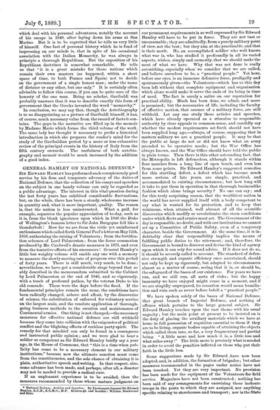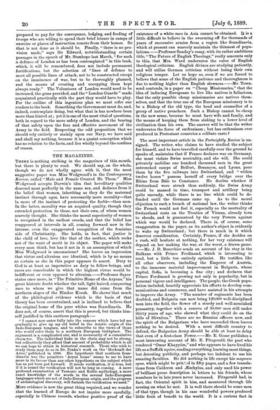GENERAL HA WILEY ON NATIONAL DEFENCE.* Sin EDWARD HANMEY has
performed such conspicuously good service by his firm and temperate advocacy of the duties of National Defence, that the collection of his essays and speeches on the subject in one handy volume can only be regarded as a public advantage. The interest in this vital question during the last forty years has exhibited considerable fluctuations, but, on the whole, there has been a steady, wholesome increase in quantity and, what is more important, quality. The reason is, that the nation is less uninstructed. What a gulf, for example, separates the popular appreciation of to-day, such as it is, from the blank ignorance upon which in 1848 the Duke of Wellington's famous letter to Sir John Burgoyne fell like a thunderbolt ! How far we are from the virile yet nninformed enthusiasm which called forth General Peel's letter on May 12th, 1859, authorising the raising of Volunteers ; from the fortifica- tion schemes of Lord Palmerston; from the fierce commotion produced by Mr. Cardwell's drastic measures in 1871, and even from the tentative efforts of his successors ! General Hamley's little but weighty volume will enable any one with a memory to measure the slowly moving rate of progress over this period of forty years. There is still much, very much, to be done; nevertheless, we have got a considerable stage beyond that so ably described in the memorandum submitted to the Cabinet by Lord Palmerston at the end of 1846, and so vigorously, with a. touch of profound pathos, by the veteran Duke to his old comrade. These were the days before the flood. If the fundamental principles remain the same, the conditions have. been radically changed, ashore and afloat, by the discoveries of science, the substitution of enforced for voluntary service an the largest scale, and the resolute application of thorough- going business methods to the creation and maintenance of Continental armies. One thing is not changed,—the necessary measures for effective national defence are still withheld because they come into collision with the exigencies of political conflict and the blighting effects of reckless party spirit. The remedy for that mischief can only be found in a courageous and instructed public opinion ; and we were glad to hear a soldier so competent as Sir Edward Hamley boldly say a year ago, in the House of Commons, that "this is a time when pub- licity has come to be a necessary element in our military institutions," because now the ultimate sanction must come. from the constituencies, and the sole chance of obtaining it is plain, authoritative speech and writing. In that respect, also, some advance has been made, and perhaps, after all, a disaster may not be needed to provide a radical cure.
If an unpleasant experience is to be avoided, then the measures recommended by those whose mature judgment on
• Natioltal Defence: Articles and Speeches. By Lenten ,GeneralSir Edward. RstaleD &Rat, Ediabtugh and London: Wilhiau Blackwood. and Bans. our permanent requirements is so well expressed by Sir Edward Hamley will have to be put in force. They are not vast or 'unreasonable ; they are admittedly, from a purely military point of view, not the beat; but they aim at the practicable, and that is their merit. He, an accomplished soldier who well knows what war is, who has studied it profoundly in all its varied aspects, wishes, simply and earnestly, that we should make the most of what we have. Why that was not done is really astonishing, especially when' we consider that we are called, and believe ourselves to be, a "practical people.' Yet here, before our eyes, is an immense defensive force, prodigally and spontaneously given—the Volunteers—which has to this day been left without that complete equipment and organisation which alone would make it serve the ends of its being in time of need. The fact is surely a satire on our reputation for practical ability. Much has been done, we admit, and more is promised; but the necessaries of life, including the faculty of effective motion, that essence of a military force, are still withheld. Let any one study these articles and speeches, which have already operated as a stimulus to responsible authority by clear appeals to common-sense, and candidly say whether the modest requirements set forth should not have been supplied long ago,—always, of course, supposing that in matters military we are a practical people. It may be that the public at large do not or did not know what an army intended to be operative needs ; but the War Office has always known, and the War Office should have told the public in plain terms. Then there is this other astounding fact, that the Metropolis is left defenceless, although it stands within four marches from a long line of open beach, and even less from some points. Sir Edward Hamley's suggested remedies for this startling defect, a defect which has become much more serious of late years, are simple, practical, and accommodated to existing circumstances ; but how long will it take to put them in operation in that thorough businesslike fashion which alone brings security ? No one can say ; and for this truly surprising reason, that the wealthiest nation in the world has never supplied itself with a body competent to say what is wanted for its protection, and to keep that minimum, when attained, well abreast of all the scientific discoveries which modify or revolutionise the stern conditions under which fleets and armies must act. The Government of the day is responsible, no doubt, and with our institutions we cannot set up a Committee of Public Safety, even of a temporary character, beside the Government. At the same time, it is in- dubitably clear that responsibility implies the means of fulfilling public duties to the uttermost; and, therefore, the Government is bound to discover and devise the kind of agency upon which it can rely for sound advice. If it does not do so, it should be severely called to account. The standard of defen- sive strength and organic efficiency once ascertained, should not only be kept up rigorously, but adapted to circumstances almost as a matter of course, seeing that it is, or should be, the safeguard of the bases of our existence. For years we have run, and we still run, all sorts of risks ; but the happy immunity we have enjoyed might cease in a moment, and if -we are stupidly unprepared, its cessation would mean humilia- tion and ruin such as never before befell a "practical people."
We have spoken solely of the bases of National Defence, that great branch of Imperial Defence, and nothing of offence which pertains to the large general subject. Sir Edward Hamley touches upon the vast theme with his usual sagacity ; but the main point at present to be insisted on is the duty of placing the auxiliary materials which we have at home in full possession of requisites essential to them if they are to be living, organic bodies capable of attaining the objects which called them into, so far, a very fragmentary and partial being. "A little more and how much it is, a little leas and. what miles away !" The little more is precisely what is needed in order to avoid the penalties inflicted on those who put their 'faith in the little less.
Some suggestions made by Sir Edward .have now been , adopted, and, in addition, the formation of brigades; but other measures recommended in the pages under notice have not 'been touched. Yet they are very important. No provision has been made for the equipment of the Volunteers for field service. Magazines have not been constructed ; nothing has been said of any arrangements for exercising these inchoate troops in the posts to which they are assigned, nor anything -specific relating to storehouses and transport; nor is the State
prepared to pay for the conveyance, lodging, and feeding of troops who are willing to spend their brief leisure in camps of .exercise or places of instruction remote from their homes. So that is not done as it should be. Finally, "there is no pro- vision made," says Sir Edward, notwithstanding certain passages in the speech of Mr. Stanhope last March, "for such a defence of London as has been contemplated" in this book, which, it will be remembered, does not include permanent fortifications, but the selection of "lines of defence to meet all possible lines of attack, not to be constructed except on the imminence of war, but to be thoroughly planned, and the means of creating and occupying them kept always ready." The Volunteers of London would need to be increased, the guns provided, and the "London Guards" made acquainted practically with the part they would have to play. For the outline of this ingenious plan we must refer our readers to the book. Something the Government must do, and, indeed, contemplate doing, but what that is has nowhere been more than hinted at; yet it is one of the most vital of questions, both in regard to the mere safety of London, and the bearing of that safety upon the free and effective movement of the Army in the field. Respecting the odd proposition that we should rely entirely or mainly upon our Navy, we have said and shall say nothing, because it is a quaint conception which has no relation to the facts, and lies wholly beyond the confines of reason.











































 Previous page
Previous page